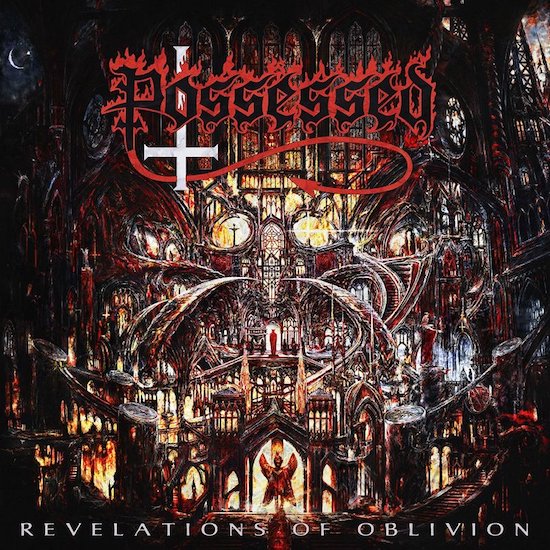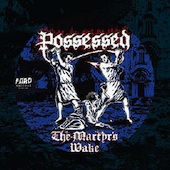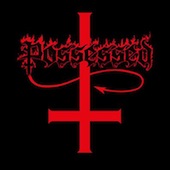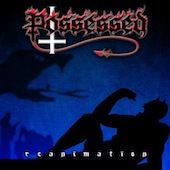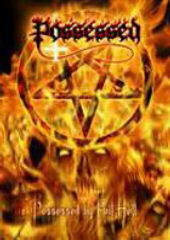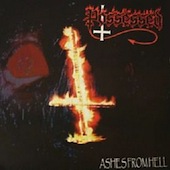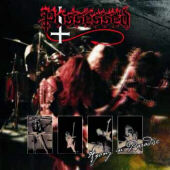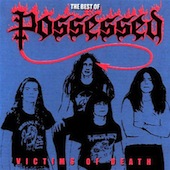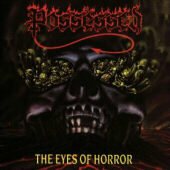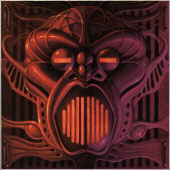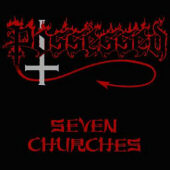Possessed - Interview
In this interview you're about to read, Andy Burgess, guitarist for Praying Mantis, reflects on the creative process and the evolution of the band's sound on their new album "Defiance". He explains how the group has maintained its melodic roots and AOR influence, elements that set them apart from other bands in the NWOBHM movement. Collaboration between members, a focus on strong melodies, and striking backing vocals are characteristics that continue to define Praying Mantis' identity, even after more than five decades of existence. In addition, Burgess talks about the positive reception of "Defiance", especially in Japan, where the band performed a tour celebrating its 50th anniversary. He also shares curious stories, such as the re-recording of Russ Ballard's track "I Surrender", and comments on the desire to finally play in South America, with plans for a tour in Brazil in 2025.
Marcelo Vieira

The press release mentions that "Defiance" builds on the success of "Katharsis" while staying true to your roots. Can you elaborate on how "Defiance" builds upon the previous album and which elements of your roots are most prominent?
Yeah, sure. I joined the band in 2007—I'm terrible with dates. We first did the "Sanctuary" album, followed by "Legacy", and then another Sanctuary album with Mike Freeland and a different drummer. Since "Legacy", we've brought in two Dutch members, JC Kuypers (vocals) and Hans in't Zandt (drums). The last four albums, including "Defiance", have been with this lineup. Over time, we've developed a distinct sound and working method that really suits us. "Defiance" continues from where "Legacy", "Gravity", and "Katharsis" left off. Chris, Tino (the founding members of Mantis, who started back in '74), and I still maintain the melodic style and backing vocals that have always set Praying Mantis apart from other NWOBHM bands. While a lot of the genre focuses on heavy guitar-driven music, Mantis has always emphasized melody and harmonies.
The writing process is quite collaborative. Chris, Tino, and I each contribute songs, and we work in our home studios, sharing ideas and pooling our work together. The twin guitar harmonies and strong backing vocals are the key elements that continue to define Praying Mantis, and that's what we remain faithful to.
"Defiance" has a more melodic and AOR-influenced sound compared to some of Praying Mantis' earlier work. Was this a conscious decision, or did the sound evolve naturally?
It wasn't a conscious decision—it's just how we write. We throw ideas into the mix, and the songs that stand out with strong melodies and choruses naturally come to the forefront. We haven't been a "metal" band for quite some time, even in the early days. If you listen to Captured City or Time Tells No Lies, the sound was always more melodic rock than outright metal. These days, we have more resources at our disposal—keyboards, more sophisticated recording techniques—and our influences lean toward melodic rock. We still share bills with NWOBHM bands at festivals, which creates an interesting mix, but it works. We just finished a successful tour in Japan, where the audience was really receptive to this blend of styles. It's a formula we enjoy, and it continues to resonate with fans.
Two months ago, I interviewed Neil Kay, the DJ from the Bandwagon. He mentioned that, in his opinion, no other NWOBHM band deserved more than Praying Mantis to achieve greater success. In your opinion, what prevented the band from reaching that higher status?
There are a lot of stories, and Tino and Chris could probably tell you more. But I think it comes down to management decisions and timing. The opportunities were definitely there, but things didn't align perfectly. Tino and Chris also had families and other careers, so that played a role. Bands like Iron Maiden had a very strong management team from the beginning, with a clear vision and an iconic image. For Mantis, things got a bit lost between Time Tells No Lies and our early success in Japan. But honestly, we're happy with where we are now. Sure, we'd love to have our own private jet, but there aren't many bands in that position these days. We're mature, we enjoy what we do, and we get to travel and perform around the world. It could have gone differently, but we're content with how things turned out.
It's impressive how classic bands like Praying Mantis are still releasing strong albums today. What are your thoughts on bands from the same era, like Tokyo Blade, who are also putting out solid material?
Yeah, it's great! We tour quite a bit in Europe, especially in Germany, and often play with bands like Demon. There are still plenty of bands from the early days that are going strong. I remember being a fan in 1979, going to shows in London where you could see bands like Iron Maiden, Mantis, and others in small clubs. It was an amazing time for NWOBHM. Nowadays, the structure is different, and there isn't the same network of venues, so we have to be more strategic. But we see the same bands still doing it, and we all love what we do. The passion is still there, and thankfully, we're all still alive and kicking!
Andy Boulton from Tokyo Blade, whom I've interviewed a couple of times, mentioned that he stopped feeling the pressure to live up to past glories and gained more creative freedom. Does this apply to Praying Mantis as well?
Absolutely. We're on Frontiers Records, a label known for its AOR-style bands, and it suits us well. We don't write for the label specifically, but the material we produce fits nicely with their roster. When we perform live, especially in places like Germany or Japan, we play a lot of our older material too, because that's what some fans want to hear.
At the same time, we have the creative freedom to write new songs without feeling bound to our past. We understand the legacy and why people come to see us, and we enjoy playing the older tracks just as much as the new ones. But as musicians, we don't want to be stuck in 1979—we need to move forward while still honoring the past.
The album features a cover of Russ Ballard's "I Surrender." Can you explain the decision to revisit this song and how you put your own stamp on it?
Actually, it was my idea. There's a story from the 1970s when Mantis was offered the song, and they recorded a demo. But then they were told Rainbow was releasing it, and their version became a global hit. It's a story that pops up every now and then, and I thought, "Why not try it again?" I pulled together the basis for the track, and when our singer John was in town, we got him into the studio to record the vocals. It worked out really well. Tino added a guitar line that gave it more of a Mantis feel, and we weren't trying to redo the song but just give it our own spin. It was fun to record, and it's a great track. We actually realized after our Japan tour that we should have played it live there—it would've gone down well!
Several reviewers mentioned specific tracks like "Forever In My Heart," "Standing Tall," and "Let's See" as standouts on the album. Which songs stand out to you personally?
We've been playing Standing Tall live, and it's definitely a departure from NWOBHM—it's got a disco beat! Tino wrote it, and when he first played it for me, I thought, "Let's rock this!" It's become a big part of our live set, and it's interesting to see a room full of rock fans dancing to that groove, but it works! Forever In My Heart was another song that came together quickly, based on a melody John brought in. It's one of those tracks that developed smoothly. For me, I'm particularly fond of Night Swim, the instrumental track Tino and I wrote. I've always been a big fan of Joe Satriani, and I wanted to do something different. We hadn't done an instrumental since the 90s, so it was fun to experiment with harmonies and guitar layers.
How has the initial fan and critical reception been for Defiance?
The reception has been really positive. You never know how an album will be received, but we have a formula that works, especially with Frontiers. We're not going to shock anyone by suddenly doing death metal or anything like that! Japan, in particular, has been very enthusiastic about this album. We hadn't toured there in seven years, and the feedback has been incredible. The venues were packed, and the fans were very happy with the new material. We couldn't have asked for a better response.
This year marks the band's 50th anniversary. Are there any special plans for celebrating this milestone?
Our tour in Japan was partly to celebrate the 50th anniversary. We called it "The Last Tour of Japan" because it's getting harder to make the logistics work. But after how well it went, we're already thinking about going back! Our t-shirts for the tour had a special 50th-anniversary logo. It's crazy to think that Tino and Chris started the band 50 years ago. The real anniversary might be when Time Tells No Lies came out or when Metal for Muthas featured Captured City, but either way, 50 years is a long time, and we're still going strong!
Are there any plans for Praying Mantis to tour South America, specifically Brazil, to promote the new album?
Yes, we're currently working on it! We've always wanted to come to South America, and we've seen bands like Tank and others make it happen regularly. Finding the right promoter and package has been a challenge, but things are falling into place for 2025. For me personally, it would be a dream come true to finally perform in Brazil. Every time we've gotten close, something has gone wrong. But this time, everything seems to be aligning, and we're very optimistic that it's going to happen.
Link for video version: https://youtu.be/nfaR0W5iObM
"These have been the best days of my life," said Jeff Becerra, lead singer of the legendary band Possessed, in the interview you are about to read. At 55 years old, Becerra has been in top form since the group returned to the spotlight with the acclaimed "Revelations Of Oblivion" in 2019 and acts as a bastion of death metal, bringing to the stage the old school vibe that won over fans around the world. Despite this legendary status, he emphasizes the importance of supporting new artists, highlighting that they are the future of metal. For him, giving space to new bands is essential to keep the genre alive and constantly evolving. Finally, in reflecting on Possessed's trajectory, Becerra expresses the hope that the band will be remembered as a genuine and passionate force on the music scene, who fought relentlessly to bring their art to the public - and their continued commitment to releasing new work and performing live demonstrates their determination to keep the group's spirit alive and relevant for future generations.
Marcelo Vieira

Possessed is often credited as the pioneering group of death metal. Can you tell us about the creative process behind developing this distinctive sound, particularly on the "Seven Churches" album?
To be honest, we were just kids. I wrote 'Burning In Hell' when I was 11. At that time, I read a lot of Edgar Allan Poe and the Book of Revelation [from the Bible]. I always liked references to Lucifer and Satan in music. I was a very dark and rebellious kid. I grew up in a Catholic church, going to Mass three times a week from an early age. I did catechism and had a deep understanding of what the Bible meant to people and what it really was. Catholics are very scholarly, and this has nothing to do with handling snakes or exorcising demons. My parish was quite academic, with Latin Masses, and the priest had studied at Harvard. I even seriously considered becoming a priest, but I wanted to have children and loved metal, so it didn't make sense. My struggle with God and my 17-year journey to truly find Him are present in my lyrics. I believe that by deconstructing religion, I found God in a different way, looking at people and seeing that if there is a God, He is in them. We should respect each other, regardless of politics or religion. If we were kinder, the world would be much better.
"Seven Churches" was highly acclaimed for its speed and brutality, but "Beyond The Gates" (1986) received a mixed reception. Can you share more about the creative decisions and challenges that influenced the direction of the second album?
Possessed is very controversial because we were the first death metal band. When I got shot, many people started boasting about being the first, but no one does that in front of me. I know what we did. While Venom had black metal and there was speed metal and thrash metal, we decided to establish ourselves as death metal because that moniker hadn't been used yet. I wrote the song 'Death Metal' as an anthem and promoted ourselves as the fastest, most satanic, and heaviest death metal band on the planet. At that time, we achieved that. After we released our demo, other death metal bands started to emerge, and then we realized we were part of a movement. After I got shot, I felt like I was kicked out of the movement I created and had to fight to get back in. It's not that I want praise, I just don't like lies or historical revisionism.
Would you like to discuss the impact of the traumatic event in 1989, when you were shot and became paraplegic? How did you navigate through this difficult period and continue to contribute to the metal scene?
I dealt with it like anyone else would: you either live or die. First, I tried to kill myself with drugs and alcohol for five years. That doesn't help the recovery process, as PTSD is real. I spent some time in a shelter, then rented a small house and isolated myself, playing bass and writing music. It was like a bad drug experiment, but since I didn't die, I quit. I enrolled in a community college; took an IQ test while detoxing and got a scholarship. I got high grades, became class representative, joined honor societies, and became a webmaster. This brought my soul back. Before, I felt like I was crawling through the desert without water. After college, I felt a thirst for life and was ready to start again, optimistic. I'm an eternal optimist. We all have our rock bottom, and I believe we can relate to that. Everyone has their spiritual journey, and hopefully, we come out of it stronger.
Physical and mental health is crucial for musicians to continue making music and performing live. How do you see the importance of taking care of your health as a touring musician, and what does it mean to you personally?
I don't know if I'm the best person to talk about this because at home, I don't drink, don't do anything, I'm quite calm. But I can say that it's important to take care of yourself. You can't drink and party every day and then go on tour, or you'll collapse. Touring is the hardest job in the world. I've worked in construction, but touring is even harder. It's exhausting, challenging, and brutal, especially for someone my age. You have to love it. Many bands break up because they can't handle touring, but a band is only truly a band when it hits the road. That's what makes metal unique and authentic.
After a long hiatus, Possessed returned to the spotlight with the release of "Revelations Of Oblivion" in 2019. How has the band's music evolved over the years?
Mostly, Daniel Gonzalez [guitarist] and I wrote that album. We're kind of like [Paul] McCartney and [John] Lennon. It's been an honor and quite an experience because I'm very influenced by the musicians around me. Daniel is amazing. He's a trained sound engineer and extremely professional. It's always a pleasure to work with him. Everyone in the band is a veteran, except for Chris [Aguirre II], our drummer, who had his first European tour. This brought new and fun energy to the band. Of course, it's hard work and sometimes frustrating, but it's like making a movie or any other difficult project.
Can you give us any updates on the progress of the new Possessed album mentioned in your recent interviews?
I'm not halfway through yet, but if I weren't touring, I could finish it in six months. I don't want to rush things and also depend on the other band members. Sometimes I feel like they are an obstacle, but other times I feel like I'm the one holding things back. I'm trying to release it this year, but I'm not sure.
What can fans expect in terms of musical direction and themes?
It's different, but still Possessed. It's more similar to "Beyond The Gates" than "Seven Churches". It's like a fusion of the last two albums. I'm experimenting with vocals and harmonies while still keeping the characteristic growl. It's a "headier" album, and I think it's turning out very well.
Looking at Possessed's career, what do you believe is the band's legacy within metal?
I hope people know that we won't live forever. When I die, I want to be remembered as a genuine guy who loved playing music and fought his whole life for it. I hope they build a shrine in my memory! [Laughs.] Jokes aside, I want to be remembered and not forgotten. That's why we need to release these albums.
What do you hope fans take away from the band's music?
I hope they have a lot of fun. I want the money they pay to see us to be rewarded with an unforgettable experience. For me, I would do [shows] for free. I'm definitely not in this for the money. I want people to be happy, enjoy the music, and leave their troubles behind, headbanging with Possessed.
What is the importance of giving space to new bands and helping to promote local scenes?
I strongly support new artists. I love new bands because they are the future. Many people say that extreme metal always sounds the same, but that's because they keep listening to the same old bands. However, the future lies in the new bands, and there's always that new band that could be the next Megadeth or Sepultura. The importance of new bands is that they are the future. We need them to keep the music alive and ensure it never dies.
Finally, is there anything you'd like to express gratitude for or acknowledge about your time in the band?
I want to thank everyone who buys tickets and supports Possessed. Without the fans, I would be lost. I received thousands of letters asking when I would be back. Those letters were like a ray of hope in moments of uncertainty. I think the prospect of coming back with Possessed brought me back to the light of music, life, and family. It's been a journey, an odyssey. The fans have always been there guiding me. These have been the best days of my life.
Discography
Upcoming Releases
- Morrath - Obscure Abominations - Feb 25
- Morrath - Obscure Abominations - Feb 25
- Chalice - Divine Spear - Feb 27
- Blackwater Drowning - Obscure Sorrows - Feb 27
- Chalice - Divine Spear - Feb 27
- Vide - Aux Enfants Des Ruines - Feb 27
- Blackwater Drowning - Obscure Sorrows - Feb 27
- Vide - Aux Enfants Des Ruines - Feb 27
- The Leaving - The Leaving - Mar 06
- The Leaving - The Leaving - Mar 06
- Serpent Icon - Tombstone Stories - Mar 06
- Serpent Icon - Tombstone Stories - Mar 06
- Insect Inside - Reborn In Blight - Mar 06
- Insect Inside - Reborn In Blight - Mar 06
- Triumpher - Piercing The Heart Of The World - Mar 06
- Triumpher - Piercing The Heart Of The World - Mar 06
- Lömsk - Act II - Of Iron And Blood - Mar 06
- God Against Humanity - The Judgement - Mar 06
- Lömsk - Act II - Of Iron And Blood - Mar 06
- Miserere Luminis - Sidera - Mar 06
- God Against Humanity - The Judgement - Mar 06
- Gravemass - This Is The Way - Mar 06
- Miserere Luminis - Sidera - Mar 06
- No/Más - No Peace - Mar 13
- Gravemass - This Is The Way - Mar 06
- Monstrosity - Screams From Beneath The Surface - Mar 13
- No/Más - No Peace - Mar 13
- Against I - Anti Life - Mar 13
- Monstrosity - Screams From Beneath The Surface - Mar 13
- Empire Of Disease - While Everything Collapses - Mar 19
- Against I - Anti Life - Mar 13
- Hanging Garden - Isle Of Bliss - Mar 20
- Putred - Blestemul Din Adânc - Mar 20
- Empire Of Disease - While Everything Collapses - Mar 19
- Gaerea - Loss - Mar 20
- Hanging Garden - Isle Of Bliss - Mar 20
- Putred - Blestemul Din Adânc - Mar 20
- Diatribes - Degenerate - Mar 20
- Gaerea - Loss - Mar 20
- Diatribes - Degenerate - Mar 20

